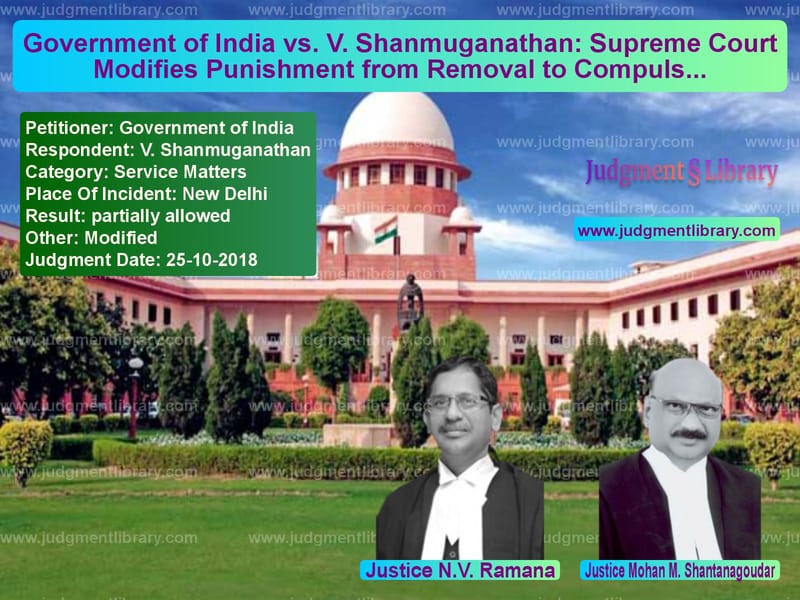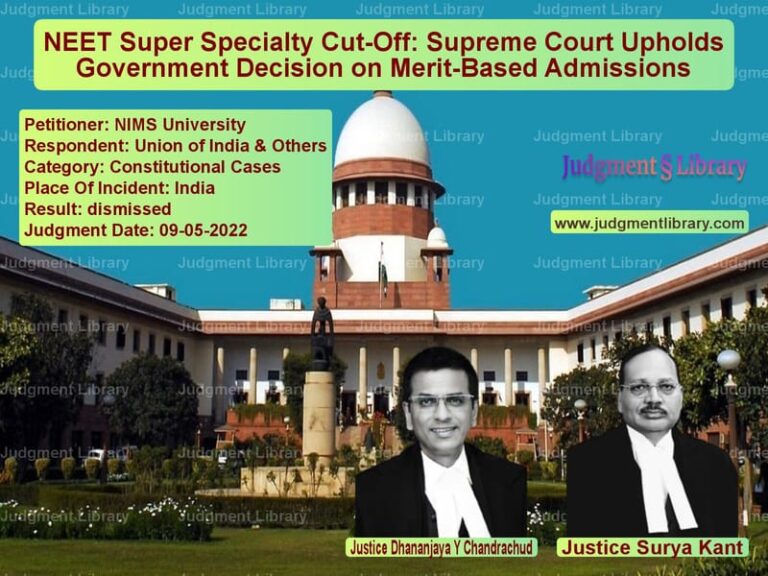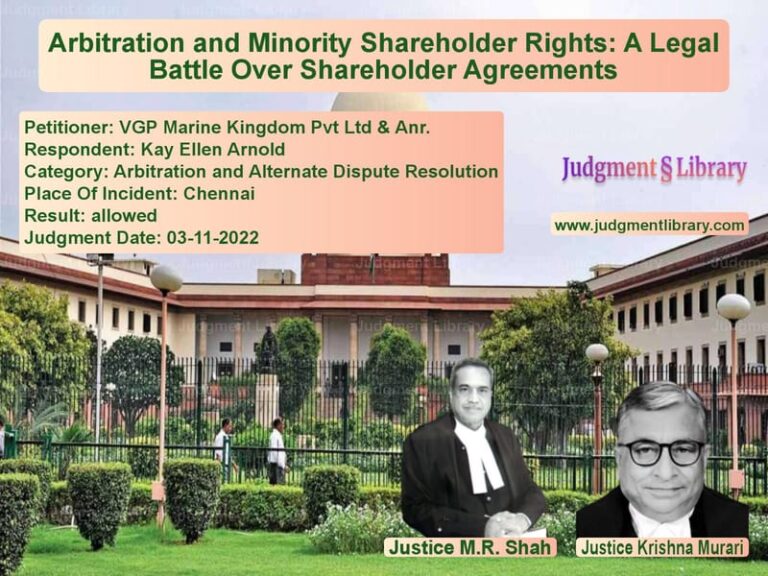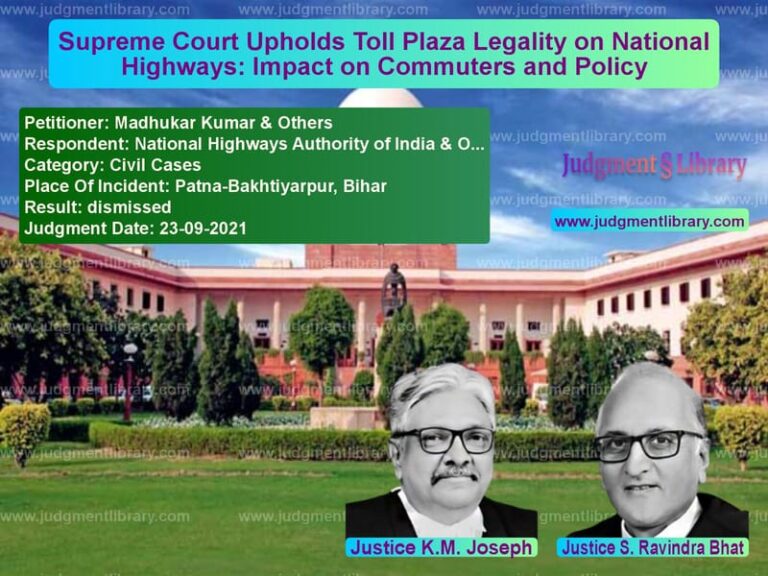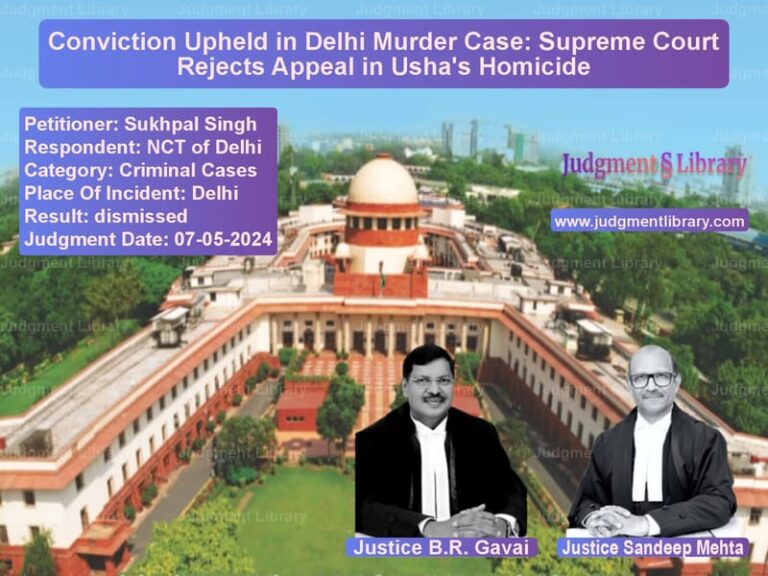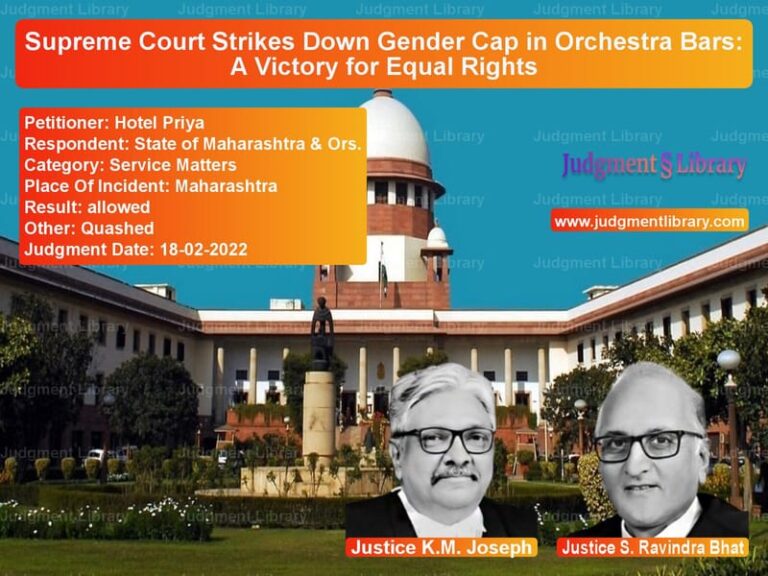Government of India vs. V. Shanmuganathan: Supreme Court Modifies Punishment from Removal to Compulsory Retirement
The case of Government of India vs. V. Shanmuganathan revolves around the disciplinary action taken against an officer of the Central Industrial Security Force (CISF). The Supreme Court of India, in its judgment dated 25th October 2018, modified the punishment of ‘removal from service’ to ‘compulsory retirement’ and granted the respondent retiral benefits.
Background of the Case
The respondent, V. Shanmuganathan, was employed as an Inspector in the CISF. In December 1993, he was transferred from New Delhi to Oil Duliajan, Assam. However, he failed to report for duty and remained absent for over two years. The department initiated disciplinary proceedings, which resulted in the removal of the respondent from service. The key issues in the case included:
- Whether the respondent’s absence from duty for more than two years was justified.
- Whether the punishment of ‘removal from service’ was proportionate to the misconduct.
- The respondent’s claim that he was unable to join duty due to an accident in Delhi.
Aggrieved by his removal, the respondent challenged the decision before the Madras High Court, which ruled in his favor by quashing the dismissal order. However, the High Court did not grant him back wages.
High Court Proceedings
The Madras High Court held that:
- The punishment of removal from service was disproportionate and exorbitant.
- The respondent should be reinstated but would not be entitled to back wages.
- The period of absence should be counted for service benefits.
Following the High Court’s decision, the respondent approached CISF for reinstatement. However, CISF refused to reinstate him, citing that an appeal was pending before the Supreme Court.
Arguments by the Petitioner (Government of India)
The Government of India argued that:
- The respondent was absent from duty without authorization for more than two years.
- His claims of being unable to join duty due to an accident were not substantiated.
- The disciplinary authority followed due process in awarding the punishment.
- The Madras High Court erred in setting aside the punishment imposed by the CISF.
Arguments by the Respondent (V. Shanmuganathan)
The respondent countered:
- His failure to report for duty was due to an accident in Delhi, which left him unable to travel.
- The disciplinary action taken against him was excessive and unfair.
- The Madras High Court’s decision should be upheld, allowing him to be reinstated.
Supreme Court Judgment
The Supreme Court reviewed the facts and held that the punishment of removal from service was too harsh. Instead, it substituted the punishment with compulsory retirement, allowing the respondent to receive retirement benefits.
The Court directed:
- The respondent’s punishment should be modified to compulsory retirement.
- The respondent should be granted retiral benefits as per CISF rules.
- The benefits should be calculated from June 7-8, 2007, when he sought reinstatement but was denied.
Key Observations by the Supreme Court
The Court noted:
“The punishment of removal from service is disproportionate in the present case. Instead, the respondent shall be deemed to have been compulsorily retired from service with entitlement to retiral benefits.”
The Court further held:
“Considering the long pendency of this case, it is appropriate that the respondent receives his due service benefits from the date of his application for reinstatement.”
Final Judgment
The Supreme Court:
- Modified the punishment from ‘removal from service’ to ‘compulsory retirement’.
- Directed that the respondent be paid retiral benefits from June 2007.
- Disposed of the appeal with no order as to costs.
Legal Precedents and Significance
The judgment reinforces important principles in service law:
- Proportionality in disciplinary actions – Punishments should not be excessive.
- Rights of government employees – Even in cases of misconduct, employees may be entitled to some service benefits.
- Importance of judicial review – Courts have the power to modify disciplinary actions if found to be unjust.
Conclusion
The case of Government of India vs. V. Shanmuganathan sets an important precedent in service jurisprudence, demonstrating that disciplinary actions must be proportionate and justified. The Supreme Court’s intervention ensured that the respondent received his due service benefits while maintaining the integrity of disciplinary rules.
Petitioner Name: Government of India.Respondent Name: V. Shanmuganathan.Judgment By: Justice N.V. Ramana, Justice Mohan M. Shantanagoudar.Place Of Incident: New Delhi.Judgment Date: 25-10-2018.
Don’t miss out on the full details! Download the complete judgment in PDF format below and gain valuable insights instantly!
Download Judgment: Government of India vs V. Shanmuganathan Supreme Court of India Judgment Dated 25-10-2018.pdf
Direct Downlaod Judgment: Direct downlaod this Judgment
See all petitions in Termination Cases
See all petitions in Pension and Gratuity
See all petitions in Disciplinary Proceedings
See all petitions in Judgment by N.V. Ramana
See all petitions in Judgment by Mohan M. Shantanagoudar
See all petitions in partially allowed
See all petitions in Modified
See all petitions in supreme court of India judgments October 2018
See all petitions in 2018 judgments
See all posts in Service Matters Category
See all allowed petitions in Service Matters Category
See all Dismissed petitions in Service Matters Category
See all partially allowed petitions in Service Matters Category

